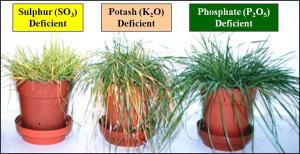Chemical fertilisers and manures will need to be applied over the next two to three weeks to get silage crops growing.

Don’t apply phosphate (P2O5) fertiliser if you don’t need it!
Unfortunately, very few grassland farmers soil-test, and therefore most are completely ‘in the dark’ regarding the nutrient status of their soils. Consequently, on many farms expensive NPK compound fertilisers are being applied routinely to grassland, regardless of whether or not phosphate is needed. In other situations, expensive compound fertilisers are being targeted at under-performing fields in the mistaken belief that these are suffering from phosphate deficiency.
It is highly unlikely that under-performing silage swards are being curtailed by phosphate deficiency. Provided phosphate in slurry is being recycled back to cutting land, there ought to be more than enough in both soil and manure to meet crop requirements without the need for additional fertiliser phosphate.
Yellow grass does NOT indicate phosphate (P2O5) deficiency!
If adequate nitrogen (N) is being applied to swards, under-performance could be due to sulphur (SO3) or even potash (K2O) deficiency. Farmers often assume that yellowing of swards is symptomatic of phosphate deficiency, when in fact it is almost certainly the result of sulphur deficiency. Swards acutely deficient in sulphur are pale green to yellow; potash deficient swards have distinctive ‘brown paper’ discoloration of older leaves, whereas phosphate deficient swards are DARK GREEN – not yellow.
In the past, sulphur deficiency was primarily confined to sandy soils, and typically occurred during summer. Today, however, it is widespread on both sandy and clay textured soils, and is now most prevalent in spring. Consequently, AFBI recommends applying between 25 and 35 kg SO3/ha, routinely, as sulphur-containing fertiliser (NS or NKS) to ALL silage swards in SPRING, even to those where slurry has been applied.
Protect your industry!
Over-use of phosphate-containing fertilisers is one of the main reasons why Northern Ireland Agriculture is currently being regulated under the European Union’s Nitrates Directive. Although use of phosphate fertilisers declined dramatically from 2000, in the last 3 years it has increased again, and there is now a risk that water quality could deteriorate once more and jeopardise Northern Ireland’s Nitrates Action Programme and derogation.
To protect the farming industry and the environment, and prevent further regulation from Brussels, farmers must manage nutrient inputs wisely and responsibly, and only use phosphate-containing fertilisers when there is definitely a phosphate requirement that cannot be met using organic manure.
written by John Bailey (AFBI, Agri-Environment)
Notes to editors:
AFBI carries out high-quality technology research and development, statutory, analytical, and diagnostic testing functions for DARD and other Government departments, public bodies and commercial companies.
AFBI's Vision is “Scientific excellence in Northern Ireland … serving the world”.
All media enquiries to AFBI Press Office
Latest news
- AFBI issues Nematodirus warning – Spring 2025 11 April 2025
- Managing Nature Based Risks to the UK Economy and Opportunities for Green Finance 08 April 2025
- AFBI Hillsborough host AERA committee 27 March 2025
- The Omics Days Conference 27 March 2025
